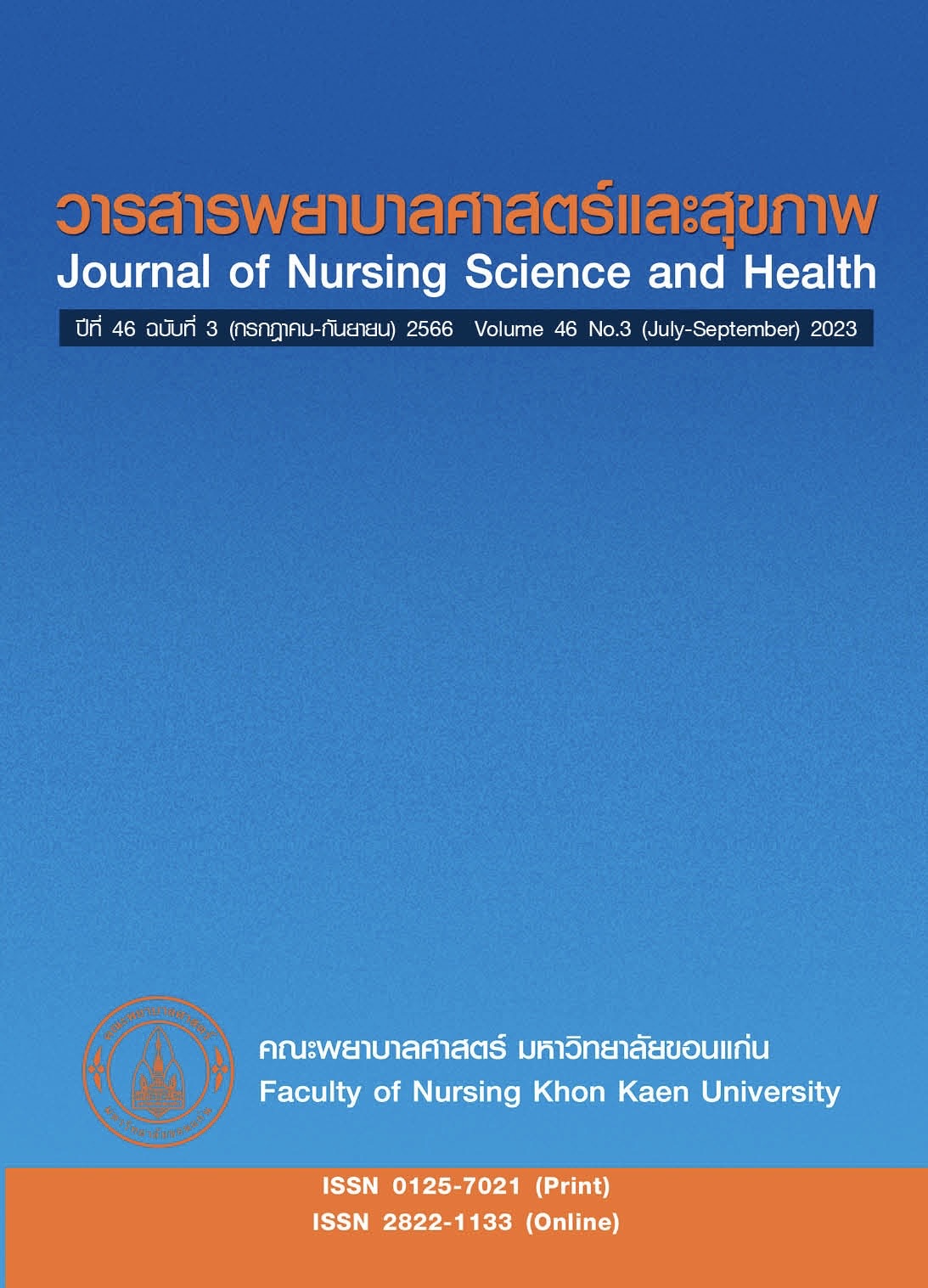ปัจจัยทำนายพฤติกรรมของบิดามารดาในการป้องกันการกลับเป็นซ้ำของโรคติดเชื้อทางเดินหายใจในเด็กอายุต่ำกว่า 6 ปี
คำสำคัญ:
การป้องกันการกลับเป็นซ้ำ, โรคติดเชื้อทางเดินหายใจ, ปัจจัยทำนาย , พฤติกรรมของบิดามารดาบทคัดย่อ
การวิจัยนี้มีวัตถุประสงค์เพื่อศึกษาปัจจัยทำนายพฤติกรรมของบิดามารดาในการป้องกันการกลับเป็นซ้ำของโรคติดเชื้อทางเดินหายใจในเด็กอายุต่ำกว่า 6 ปี กลุ่มตัวอย่าง คือ บิดาหรือมารดาของเด็กป่วยโรคติดเชื้อทางเดินหายใจที่เข้ารับการรักษาในหอผู้ป่วยกุมารเวชกรรม โรงพยาบาลประจำจังหวัดแห่งหนึ่งในภาคเหนือ จำนวน 96 คน โดยการสุ่มอย่างแบบเจาะจง เครื่องมือที่ใช้สำหรับเก็บรวบรวมข้อมูล แบ่งออกเป็น 2 ส่วน ส่วนที่ 1 ประกอบด้วย ข้อมูลทั่วไป และ แบบสอบถามพฤติกรรมของบิดามารดาในการป้องกันการกลับเป็นซ้ำของโรคติดเชื้อทางเดินหายใจในเด็กต่ำกว่า 6 ปี ส่วนที่ 2 ประกอบด้วย แบบสอบถามการรับรู้ความรุนแรงของโรค การรับรู้ความสามารถของตนเอง การได้รับข้อมูลข่าวสาร และการสนับสนุนทางสังคม ตรวจสอบคุณภาพของเครื่องมือได้ค่าดัชนีความตรงเชิงเนื้อหาเท่ากับ .85 ค่าความเชื่อมั่นของเครื่องมือได้สัมประสิทธิ์แอลฟาของครอนบาค เท่ากับ .84 ระยะเวลาในการรวบรวมข้อมูล เป็นเวลา 6 เดือน สถิติที่ใช้ในการวิเคราะห์ข้อมูล ได้แก่ ความถี่ ร้อยละ ค่าเฉลี่ย สถิติความสัมพันธ์ของเพียร์สัน และการวิเคราะห์ถดถอยพหุคูณแบบขั้นตอน
ผลการวิจัย พบว่าปัจจัยทำนายพฤติกรรมของบิดามารดาในการป้องกันการกลับเป็นซ้ำของโรคติดเชื้อทางเดินหายใจในเด็กต่ำกว่า 6 ปี อย่างมีนัยสำคัญทางสถิติที่ระดับ .01 (p-value=.001) ได้แก่ การรับรู้ ความสามารถของตนเอง (β=.260) การรับรู้ความรุนแรงของโรค (β=.254) การได้รับข้อมูลข่าวสาร (β=.179) และการสนับสนุนทางสังคม (β=.171) ซึ่งสามารถร่วมกันทำนายพฤติกรรมของบิดามารดาในการป้องกันการกลับเป็นซ้ำาของโรคติดเชื้อทางเดินหายใจได้ ร้อยละ 31.70 (R2=0.317)
ผลการศึกษาแสดงให้เห็นว่า พยาบาลและบุคลากรด้านสุขภาพควรมีการส่งเสริมการรับรู้ความสามารถตนเอง การรับรู้เกี่ยวกับโรค การให้ข้อมูลข่าวสาร และการสนับสนุนทางสังคมเป็นส่วนหนึ่งของกิจกรรมในโปรแกรมการส่งเสริมพฤติกรรมบิดามารดา ในการป้องกันการกลับเป็นซ้ำของโรคติดเชื้อทางเดินหายใจในเด็กอายุต่ำกว่า 6 ปี
เอกสารอ้างอิง
Wilmott R, Boat T, Bush A, Chernick V, Deterding R, Ratjen F. Kendig and Chernick’s disorders of the respiratory tract in children. 8th ed. Philadelphia: Elsevier Health Sciences;2012.
Burns CE, Dunn AM, Brady MA, Starr NB. Pediatric primary care. 5th ed. Philadelphia: Elsevier; 2013.
Colon PM. The child with respiratory dysfunction. In: Hockenberry MJ, Wilson D, Rodgers CC, editors, Wong’s essentials of pediatric nursing. St. Louis: Missouri; 2017:p.636-85.
Yousif TI, Elnazir B. Education and practice approach to a child with recurrent pneumonia. Sudanese journal of pediatric 2015;15:71-9.
Health Information System Development Office. Thai health state. Bangkok: Amarin Printing; 2020. (in Thai)
Supreeyaporn S, Aree P, Lamchang S. Factors related to caring behaviors among caregivers of children with recurrent pneumonia. Nursing Journal 2021;48(4):146-59. (in Thai)
Huang CY, Chang L, Liu CC, Huang YC, Chang LY, Alliance TP. Risk factors of progressive community-acquired pneumonia in hospitalized children: A prospective study. Journal of Microbiology, Immunology and Infection 2015;48(1):36-42.
Aree P, Cheychid S, Heebngern B, Sornmyura P. Factors related to care behaviors for children with pneumonia of caregivers in district 5 hospitals, Ministry of Public Health. Journal of Nursing and Health 2019;13(4):150-64. (in Thai)
Jaide C, Santati S, Kongsaktrakul C. Factors related to child care workers’ behavior in prevention of acute respiratory infection in child care centers. Rama Nurs J 2012;18(3):389-403. (in Thai)
Green LW, Gielen AC, Ottoson JM, Peterson DV, Kreuter MW. Health program planning, implementation, and evaluation: Creating behavioral, environmental and policy change. Baltimore: Johns Hopkins University Press; 2022.
Laemthaisong J, Toonsiri C, HomsinP. Factor influencing on preventive behaviors of respiratory tract infections among caregivers of preschool aged children in childcare center, Bangkok metropolitan administration. Journal of Public Health Nursing 2019;33(1): 1-19. (in Thai)
Kaewsuk C, Pongjaturawit Y, Nujjaree, Chaimongkol N. Factors associated with maternal behavior in prevention of acute respiratory infection in preschool children. The Journal of Faculty of Nursing Burapha University 2016;24(4):54-64. (in Thai)
Srikotr A, Jintrawet U, Mesukko J. Factors predicting care behaviors of caregivers to preventing respiratory tract infection in children with congenital heart disease. Nursing Journal 2018;45(4):14-25. (in Thai)
Faul F, Erdfelder E, Lang A-G, Buchner A. G*Power 3: A flexible statistical power analysis program for the social, behavioral, and biomedical sciences. Behavior Research Methods 2007;39:175-91.
Cohen J. Statistical power analysis for the behavioral sciences. South Glamorgan: Routledge Academic; 2013.
Srisaard B. Basic research. 10th ed. Bangkok: Suweereyasan; 2017. (in Thai)
Kaewsuk C, Pongjaturawit Y, Nujjaree, Chaimongkol N. Factors associated with maternal behavior in prevention of acute respiratory infection in preschool children. The Journal of Faculty of Nursing Burapha University 2016;24(4):54-64. (in Thai)
Disease Control Division Ministry of Public Health. Implementation manual for integrated immunization operations team. General Communicable Disease Control Division Department of DiseaseControl; 2023. (in Thai)
Pongjaturawit Y, Sarapat P, Chaimongkol N. Experiences of caregivers in prevention of acute respiratory infection in preschool children. Nursing Journal of the Ministry of Public Health 2021;30(3):96-109. (in Thai)
Sanyod V, Yathongchai W. Factors related to parental perceived self-efficacy in caring for hospitalized children with lower respiratory tract infection. Journal of Nursing and Health Care 2020;38(3):32-40. (in Thai)
Miller L, Richard M, Krmpotic K, Kennedy A, Seabrook J, Slumkoski C, et al. Parental presence at the bedside of critically ill children in the pediatric intensive care unit: A scoping review. European Journal of Pediatrics 2022;181:823-31.
Naksrisang W. The effect of a supportive-educative nursing program on maternal behavior in care for children with acute respiratory infection. Journal of Prachomklao College of Nursing, Phetchaburi Province 2021;4(1):82-98. (in Thai)
Thajai S, Lanchang S, Chotibang J. Parent participation in preventing infection among pediatric patients with cancer receiving chemotherapy and related factors. Nursing Journal 2014;41(4):83-94. (in Thai)
Norjan W, Pumiapiradee W, Nawsuwan K. The effects of a teaching program on knowledge among pediatric caregivers and the recurrence rate of pneumonia in a pediatric clinic, Narathiwat Ratchanakarin Hospital. Journal of Nursing and Public Health Research 2022;2(2):1-11. (in Thai)
Songthip S, Sanasuttipun W, Srichantaranit A. The effects of supportive-educative nursing system program on knowledge and behaviors of mothers of children with acyanotic congenital heart disease aged 0-2 years. Thai Journal of Cardio-Thoracic Nursing 2015;26(2):25-38. (in Thai)
ดาวน์โหลด
เผยแพร่แล้ว
รูปแบบการอ้างอิง
ฉบับ
ประเภทบทความ
สัญญาอนุญาต
ลิขสิทธิ์ (c) 2023 วารสารพยาบาลศาสตร์และสุขภาพ

อนุญาตภายใต้เงื่อนไข Creative Commons Attribution-NonCommercial-NoDerivatives 4.0 International License.
วารสารพยาบาลศาสตร์และสุขภาพเป็นเจ้าของลิขสิทธิ์ในการเผยแพร่ผลงานที่ตีพิมพ์ห้ามผู้ใดนำบทความที่ได้รับการตีพิมพ์ในวารสารพยาบาลศาสตร์และสุขภาพไปเผยแพร่ในลักษณะต่าง ๆ ดังนี้ การนำบทความไปเผยแพร่ออนไลน์ การถ่ายเอกสารบทความเพื่อกิจกรรมที่ไม่ใช่การเรียนการสอน การส่งบทความไปตีพิมพ์เผยแพร่ที่อื่น ยกเว้นเสียแต่ได้รับอนุญาตจากวารสารพยาบาลศาสตร์และสุขภาพ



